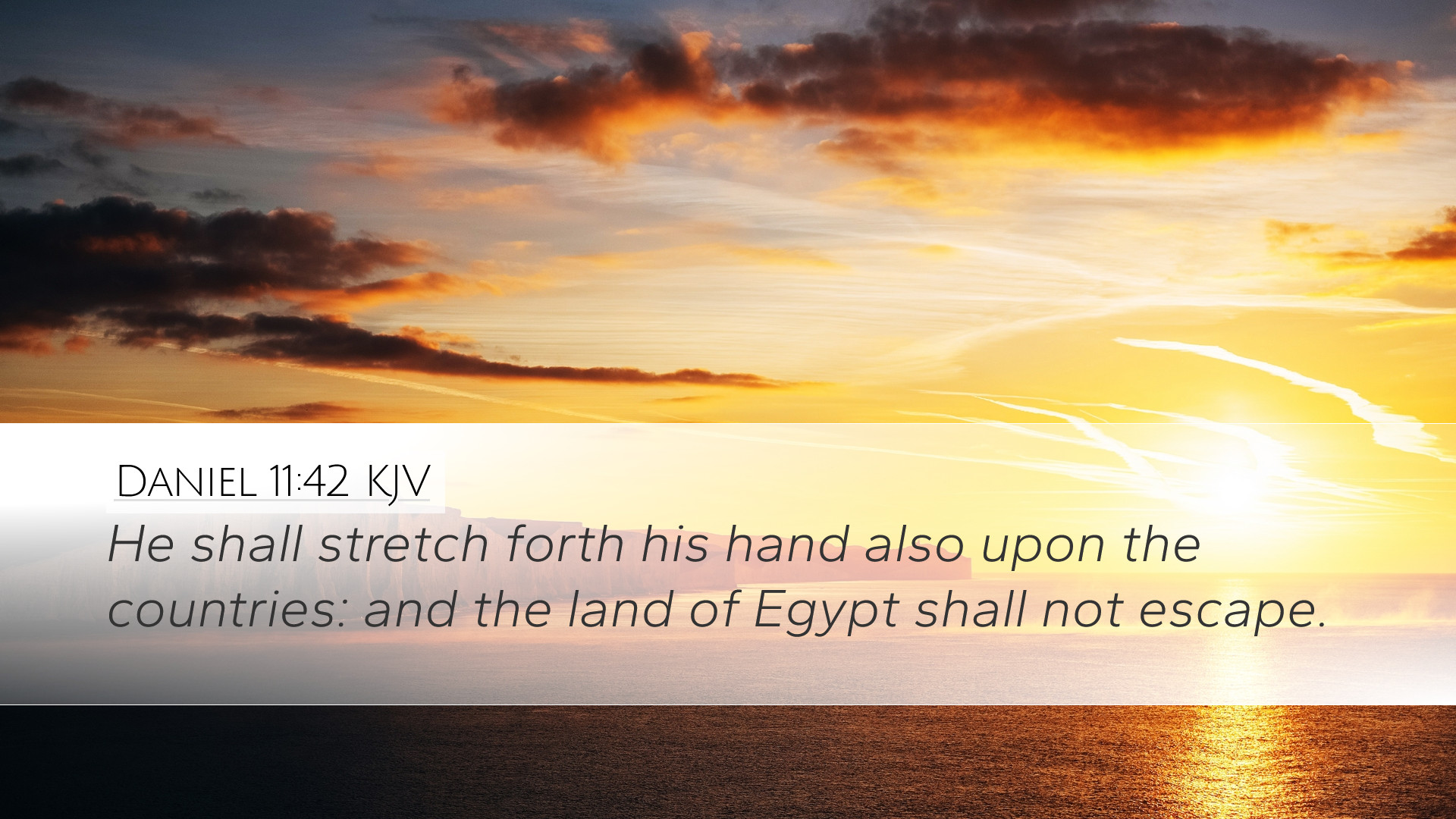Commentary on Daniel 11:42
Daniel 11:42 states: "He shall stretch out his hand against the countries, and the land of Egypt shall not escape." This verse captures a pivotal moment in the prophetic vision of Daniel regarding the rise and actions of a powerful ruler, often interpreted as the Antichrist or a significant historical figure representing oppression and tyranny.
In this commentary, we will analyze the verse through the insights of esteemed biblical scholars such as Matthew Henry, Albert Barnes, and Adam Clarke, providing a comprehensive understanding suitable for pastors, students, theologians, and Bible scholars.
Context of the Prophecy
The broader context of Daniel chapter 11 consists of a detailed prophecy concerning the kingdoms of the Medes, Persians, and Greeks, and later, a ruler characterized by deceit and aggression. This chapter intricately outlines the struggles between various kingdoms and their leaders, ultimately foreshadowing the end times.
Exegesis of Daniel 11:42
-
Matthew Henry's Commentary:
Henry emphasizes that this verse represents the expansion of power and influence that the 'king' will hold over nations. He describes the ruler as one who “stretches out his hand” in the sense of seizing control and exerting dominance over the surrounding nations, particularly Egypt. This act symbolizes not just military action but a broader geopolitical strategy, suggesting that the motivations behind such expansion stem from both ambition and hubris.
-
Albert Barnes' Notes:
Barnes interprets this verse through the lens of historical fulfillment and emphasizes the importance of Egypt as a critical player in the ancient world. He notes that the inability of Egypt to "escape" signifies the overwhelming might of this ruler and serves as a warning to nations that resist him. Barnes relates this to the historical conflicts involving various leaders in the region and highlights how the phrase encapsulates a broader theme of judgment against nations that oppose divine authority.
-
Adam Clarke's Commentary:
Clarke discusses the symbolic implications of Egypt in biblical prophecy. He notes that Egypt often represents oppression and idolatry, suggesting that the ruler’s actions are not merely political but also spiritually significant. Clarke emphasizes that the inability for Egypt to escape reflects the oppressive nature of the ruler's regime, which conquers not just lands, but also the hearts and minds of the people.
Theological Implications
The theological implications of Daniel 11:42 are vast, as it touches upon themes of sovereignty, divine justice, and eschatological expectations. The depiction of the ruler's relentless pursuit of power serves as a cautionary tale concerning the moral and spiritual consequences of tyranny and oppression.
-
Human Authority vs. Divine Sovereignty:
The text illustrates the tension between human authority and divine sovereignty. While the ruler may seem powerful, this passage invites the reader to consider that such power is permitted by God for a specific season, ultimately leading to divine judgment.
-
The Role of Nations in Prophecy:
This verse underscores the interconnectivity of nations in the prophetic timeline. Egypt's involvement highlights how nations can become subjects of broader spiritual realities that transcend their earthly existence. The implications of nation-states under judgment invite deeper reflection on current geopolitical events in light of biblical prophecy.
-
The Expectation of Hope:
While the text may suggest impending doom for opposing nations, there also resides a promise of hope for the faithful. In revealing the rise of such rulers, Scripture ultimately points towards God's ultimate plan to establish His eternal kingdom, where justice, peace, and righteousness prevail.
Application for Contemporary Life
For today’s reader, Daniel 11:42 serves as a powerful reminder of the consequences of moral and spiritual degradation in leadership. Pastors and leaders are encouraged to recognize the weight of their influence and the importance of ethical governance, understanding that authority should be exercised with a sense of responsibility and accountability to God.
As we reflect on the historical interpretation of this verse, students and scholars are called to confront the reality of political powers that oppress. The Christian response involves a commitment to pray for leaders, advocate for justice, and engage in acts of compassion toward those affected by tyranny.
Conclusion
Daniel 11:42, when examined through various commentaries, reveals deep truths about power dynamics, divine purpose, and the role of nations in the narrative of redemption. The insights from Matthew Henry, Albert Barnes, and Adam Clarke collectively guide us in reflecting upon the weight of this prophecy, allowing it to challenge, inform, and inspire our understanding of God’s sovereignty in both historical and contemporary contexts.


